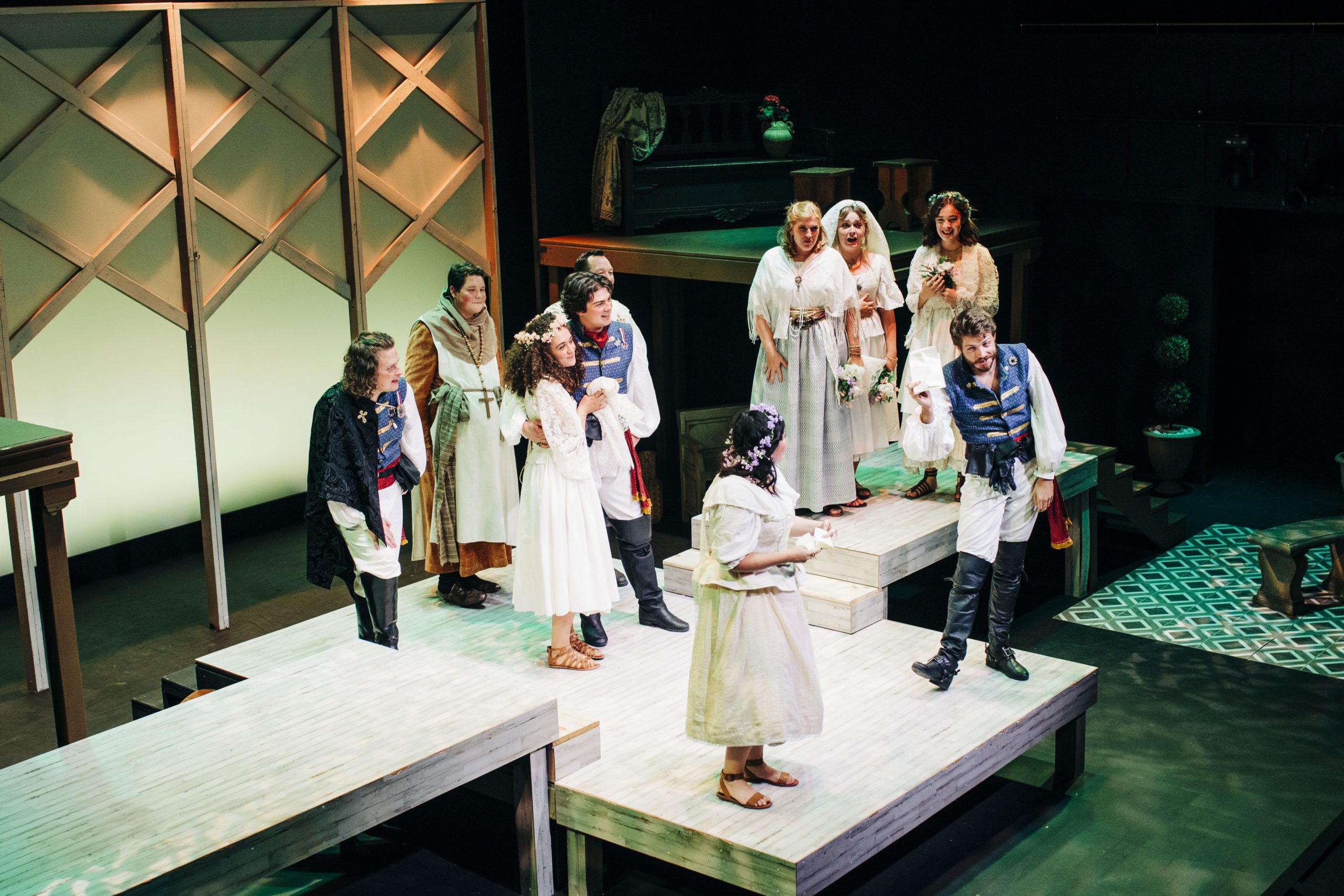SOUTH SALT LAKE — The Parker Theatre may specialize in theatre productions for children, but their new production of Much Ado About Nothing is for audiences young and old. With a talented cast, superb direction, and gorgeous designs, this Much Ado is a nonstop delight.

Joanne M. Parker‘s direction brings life to Much Ado About Nothing. Under her guidance, the show bubbles with humor so naturally that it is hard to believe that the jokes are over 400 years old. The funniest touch of the show was the three scenes where someone overhears others talking, which Joanne M. Parker filled with increasingly hilarious blocking as the eavesdroppers moved about the stage clumsily to listen better.
While Much Ado About Nothing is a comedy, the non-comedic aspects of the show are equally important to the plot. Joanne M. Parker was masterful in setting the appropriate mood for these scenes. It was easy to get swept up into the romance of Claudio proposing to Hero, for example. The solemn dignity of the funeral scene was also a sober highlight in a show most memorable for its humor.
A particularly striking aspect of the production is the wonderful stage pictures that Joanne M. Parker sprinkles throughout the show. In this effort, the director had the assistance of some talented designers. Julie Andersen and Cathy Maurer‘s costume designs made almost every performer look like they belonged on the cover of a steamy romance novel. The men looked dashing in their military uniforms, and the white dresses and laced up corsets gave the women a soft femininity that matched the idealized setting. James B. Parker created a versatile set painted in creams and browns, which soaked up the rich, saturated colors in his lighting design. All the technical elements worked together to create a show that is a feast for the eyes.

Spencer Hohl stars as Benedick in this production, and his selection is a casting success. Hohl has a confident swagger and personal magnetism that makes him a compelling romantic leading man. Particularly impressive is his ability to mine Shakespeare‘s text for clues to make Benedick a three-dimensional person who has to swallow his pride to win his love.
Most importantly, Hohl has chemistry with his Beatrice, played by Madeline Thatcher. Their first meeting on stage has a spark between them, and that spark grew until it seemed natural for Beatrice and Benedick to marry. Madeline Thatcher and Hohl also excelled at the verbal sparring between the characters, and each is adapt at delivering Shakespearean dialogue in a rapid manner with total clarity.
Madeline Thatcher’s most real moments on stage were her first scene and in the scene before Hero’s wedding. Both scenes show Beatrice with her female friends, and Thatcher and her fellow performers made the “girl talk” in the script real. Madeline Thatcher also gave Beatrice an emotional connection to Hero, which made Beatrice more than just a collection of witty retorts.

The play’s other romantic couple, Claudio and Hero, were played by Tennessee Tarrant and Cheyenne Cole, respectively. Tarrant plays Claudio as a man of action, making him believable as both a soldier and as a man who would publicly scorn his bride during a wedding. The sorrow Tarrant shows when Claudio realizes that Hero was innocent of any wrongdoing and also during the funeral scene were deeply moving. Cole is an effervescent Hero, and the affection she showed for Claudio as they held hands and cooed at each other after the proposal made Claudio’s accusations of Hero’s infidelity much more devastating.
The supporting actors were just as dedicated to their roles as the leads were. Kelly Griffiths was a dose of sobriety in the role of Leonato, and I appreciated the fatherly love he showed to his onstage daughter, Hero. Hillary McChesney plays Leonato’s sister, Antonia (a role scripted as a brother named Antonio, but gender swapped in this production), as a kind but formidable woman who works to protect her family. Zeb Hoffman was a casually malevolent force in Barachio as he carried out a plot to destroy Claudio’s relationship. The only weak link in the cast was Nathan Thatcher as Don John, who was more petulant than evil and failed to be sufficiently evil to be a compelling antagonist.
Much Ado About Nothing is one of Shakespeare’s most beloved comedies, and the Parker Theatre production shows why. Much Ado About Nothing showcases all the highs and lows of human emotion as its characters go through profound grief, exuberant joy, intense loathing, bitter jealousy, and more. The cast at the Parker Theatre do justice to this Shakespearean favorite and create a satisfying evening that I recommend for audience members aged 10 and up. Its two-hour running time exceeds the length of younger children’s attention spans.
[box]Much Ado About Nothing plays Fridays and Saturdays at 7:30 PM through September 11 at the Parker Theatre (3605 South State Street, South Salt Lake City). Tickets are $20-22. For more information, visit www.parkertheatre.org.[/box]

